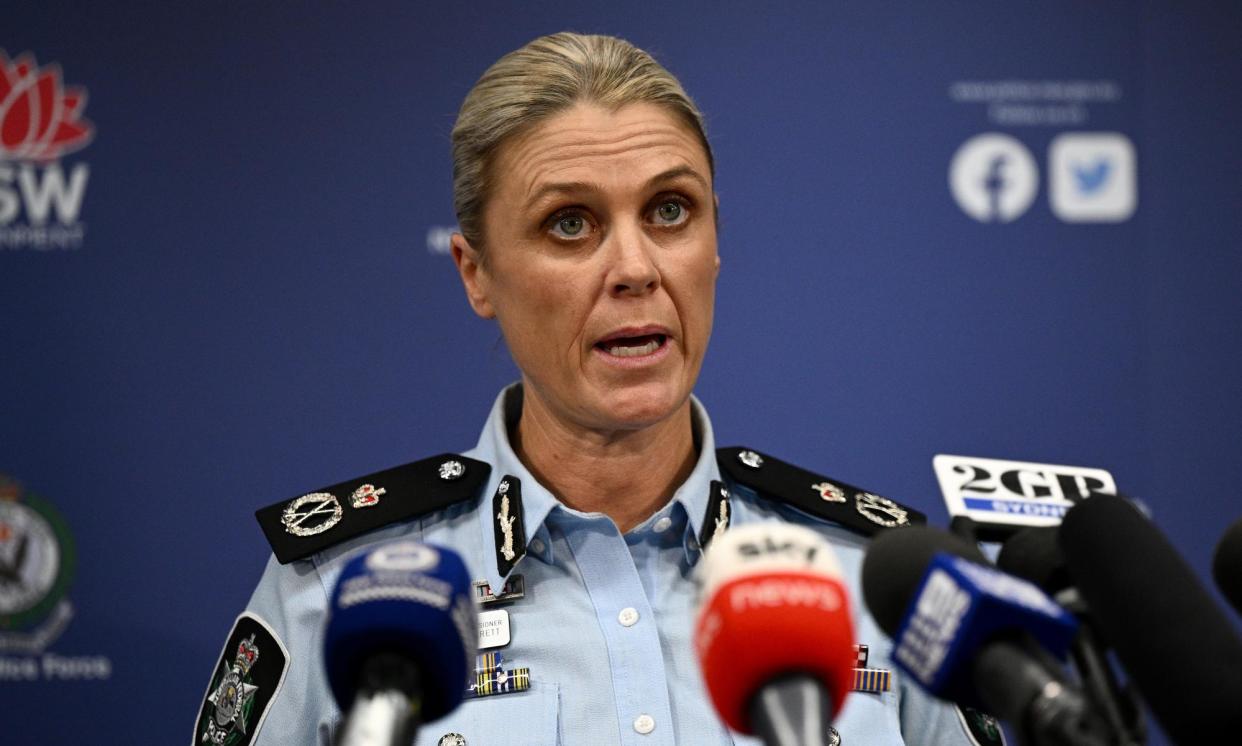Five teenagers charged with terrorism offences after police raids across Sydney

Five of the seven teenagers arrested as part of counter-terrorism raids in Sydney have been charged with a range of terrorism offences.
Two boys, aged 17 and 14, were charged at Parramatta children’s court on Thursday with possessing or controlling violent extremist material, and two 16-year-old boys were charged with conspiring to engage in an act in preparation for, or planning, a terrorist act.
One 17-year-old boy was charged with conspiring to engage in an act in preparation for, or planning, a terrorist act and for custody of a knife in a public place.
Related: Seven juveniles with alleged ‘violent extremist ideology’ arrested in Sydney counter-terror raids
All five were refused bail.
Another boy remained in custody without charge on Thursday evening, 30 hours after the raids.
A seventh juvenile was released on Thursday pending further inquiries.
On Wednesday, about 400 officers from New South Wales police and the Australian federal police executed 13 search warrants across a number of suburbs in Sydney, including Bankstown, Prestons, Casula, Lurnea, Rydalmere, Greenacre, Strathfield, Chester Hill and Punchbowl, as well as a premises in Goulburn.
The raids led to the arrests, with police saying a further five people, including two men and three juvenile males, assisted police with their inquiries.
Police said a number of items were seized, including a “significant amount of electronic material”.
The arrests and charges come amid the ongoing investigation into the 16-year-old who allegedly stabbed bishop Mar Mari Emmanuel at the Assyrian Christ the Good Shepherd Church in Wakeley last week.
The assault, during a livestreamed sermon, sparked a riot of more than 2,000 people and the search for the offenders continued when two men faced court on Thursday.
Leon Shemaon, 31, from Fairfield, was accused of rioting and trying to throw a missile at police. He was bailed on seven conditions.
One mandates Shemaon not to contact anyone he knows was inside or outside the church on 15 April.
A second alleged rioter was refused bail. Both men are due back in court on May 23.
The counter-terror arrests were carried out by the Sydney joint counter-terrorism team, comprised of members of the NSW police, Australian federal police, Australian security intelligence organisation (Asio) and NSW crime commission.
In a statement, NSW police and the AFP said there remained “no specific threat to public safety and no threat to Anzac Day commemorations”.
At a press conference on Wednesday, the deputy commissioner of the AFP, Krissy Barrett, said that authorities did not believe there was any evidence of a specific planned attack.
“We identified links between the alleged offender and a network of associates and peers who would believe shared a similar violent extremist ideology.
“At this time, we have no evidence of specific locations, times, or targets of a violent act,” she said.
The deputy commissioner of NSW police, David Hudson, said the arrests came amid ongoing concerns that “it was likely that an attack might ensue”.
“It was considered that the group, subject of our attention, posed an unacceptable risk to the people of New South Wales, and our current purely investigative strategies could not adequately ensure public safety.
“Their behaviour, whilst under that surveillance, led us to believe that, if they were to commit any act, we would not be able to prevent that.”
He described the group as being “loose” in nature, and that there were “splintering factions”.
“No specific targets had been nominated. However, it’s just the ongoing threat and loose nature of the group as well. Whilst coordinated to some degree, there were splinter factions doing their own thing as well.”

 Yahoo News
Yahoo News 
